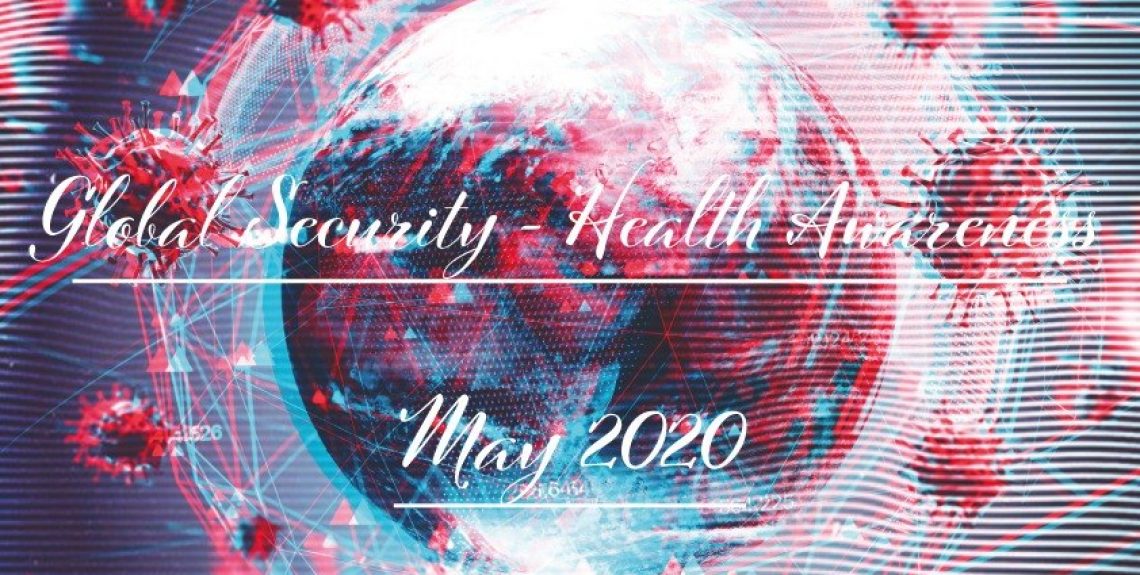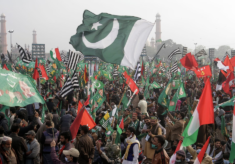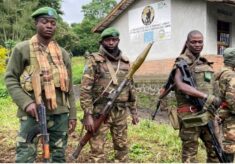NUMBER 2 – May 2020
International security does not refer anymore to military conflicts alone. The definition of international security has largely broadened and, already in NATO’s 2010 Strategic Concept, health risks were considered potential game changers for the Alliance member states and partners. This product aims to explain the links between the main global health developments and international security, stability and wellbeing.
————
#USA
Source: Blaming China for Pandemic, Trump Says U.S. Will Leave the W.H.O., Donald G. McNeil Jr. & Andrew Jacobs, The New York Times, May 29, 2020
https://www.nytimes.com/2020/05/29/health/virus-who.html
On Friday 29, US President Donald Trump said he would terminate any relations with the World Health Organisation (WHO). President Trump blamed the UN agency to have done little to warn the world about the Coronavirus outbreak, accused it to be China-centric and declared it had not enacted the reforms requested by the USA (reforms that are not yet openly declared). His decision depends also on the harsh rivalry with Beijing. Mr. Trump considers China having instigated the global pandemic and spreading fake news on COVID-19 that is, in his opinion, a “Wuhan virus”. Unprecedented measures should also take place against Chinese exports of goods to the United States and Chinese nationals on the States territory. According to several specialists, Trump’s move will have the effect of simply handing another component of global leadership over to China, while increasing the weakness of the USA as leader of the international community. Regarding the WHO, the USA are the largest donor country giving 22% of all member states contributions. This amount is offset by the considerable importance of private donors, who finance the organisation at a ratio 2:1 compared to member states. Nevertheless an effective withdrawal by Washington (a procedure that must be formalised, involves Congress, takes one year, entails still payments for year 2020 and can be subject to legal action), would deprive the USA of its veto power on health matters, damage the international response to the pandemic and jeopardise partially the organisation.
#India&China
Source: The world needs pharmaceuticals from China and India to beat coronavirus, Rory Horner, The Conversation, May 25, 2020
https://theconversation.com/the-world-needs-pharmaceuticals-from-china-and-india-to-beat-coronavirus-138388
Source: Why vaccine ‘nationalism’ could slow coronavirus fight, Richard Milne and David Crow, Financial Times, May 4, 2020
https://www.ft.com/content/6d542894-6483-446c-87b0-96c65e89bb2c
At the time of Coronavirus pandemic, geopolitical competition moved to a new battlefield: the pharmaceutical sector. Although the top five biggest pharmaceutical companies by profits are located in the USA and in Europe, globalisation contributed to create an over-dependency on China and India to supply both ingredients and finished drugs. India is the third largest pharmaceuticals producer in the world by volume. Producing 80% of the HIV medicines, 65% of the treatment for diphtheria, pertussis, tetanus, and tuberculosis, and 90% of measles vaccines, India is known to be the “pharmacy of the developing world.” However, for essential APIs (Active Pharmaceutical Ingredients), the global pharmaceutical supply chain relies almost completely on China. No question that the oligopoly of the pharmaceutical market makes it more vulnerable to possible disruptions that can have repercussions on citizens’ well-being and even on international security. Despite WHO’s efforts to coordinate the approach to find a vaccine fighting COVID-19, the USA, Russia and India are lone runners, ignoring and weakening the multilateral system. We are witnessing a “vaccine nationalism” based on export restrictions, retaliations and mistrust that puts in danger a coordinated response to this global challenge and worsening an already poor condition of the international community.
#GeopoliticalSecondWave
Source: The Pandemic’s Geopolitical Aftershocks Are Coming, Tom McTague, The Atlantic, May 18, 2020
https://www.theatlantic.com/international/archive/2020/05/coronavirus-pandemic-second-wave-geopolitics-instability/611668/
Post pandemic scenarios do not involve only the fear for a second wave of COVID-19 worldwide, they consider also the so-called geopolitical second wave that is of economic, political and military nature. For instance Russia, on the one hand, could increase its aggressive opportunism and, in an attempt to away its citizen’s attention from the economic collapse, may test NATO’s allies cohesion and pose a threat to Western security interests. On the other hand, the crisis might instead weaken the country and increase its dependency to China. The antagonism between the United States and China is likely to affect negatively the major economies of the European Union, that are willing to rely upon the American security umbrella but do not want to cut their economic ties with Beijing. In particular, Western countries will face the lack of cash to spend in defence investments to guarantee their own security. Will they be able to fulfil NATO’s defence expenditure standards? Or, will they be ready to set up a joint European military force to cope with new security menaces? The pandemic has increased the unknown variables for each alternative.
Federica Lollo
Programme Manager at the NATO Defense College Foundation since 2016. She is specialising in Global Health and the impacts on international security. She is also attending the Mentoring Programme of Women In International Security Italy.
























